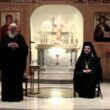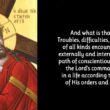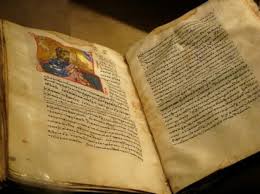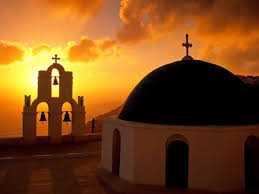- What do we understand by the canon of the Holy Scriptures books?
By the `canon` of the Holy Scriptures books we understand all the books inspired by God, more precisely the list of these books. The word `canon` didn’t have this meaning from the beginning. It is borrowed from Hebrew through Greek and it means among others `guide1 or `rule`.
We find it used as well with these two meanings in the New Testament. Saint apostle Paul, after he gives certain spiritual advice to the Galatians, adds:
And as many as walk according to this rule, peace be on them, and mercy, and upon the Israel of God. (Galatians VI, 16). Then `canons` with the meaning of `orderliness` are called the decisions regarding the ecclesiastical discipline and certain components from the ordinance of the religious services.
The books of the Holy Scripture containing the `canon`, meaning the rule of faith and life, were called `canons` with this meaning but also with the meaning of totality or list of writings comprising these rules. The word `canon` has this same meaning at the ancient Jews and at the first Christians. There is a canon of the Old Testament books and a canon of the New Testament books.
- With what condition were received the Holy Scripture books in the biblical canon ?
1) With the condition that their teaching is revealed by God through inspiration.
2) with the condition that the teaching revealed by them is guaranteed by the Church.
The Church guaranteed this teaching on the base of its age and apostolicity, in accordance with the rule of Tertulian stating that true is the thing which is older and older is the thing that is from the beginning, and from the beginning is the thing coming from the Apostles and from the Apostles it comes what it was sacred in the Apostolic Churches.
- What are the books of the Old Testament?
The books included in the canon of the Old Testament are:
- Genesis
- Exodus
- Leviticus
- Numbers
- Deuteronomy (the second law)
- Joshua (Josue son of Navi)
- Judges
- Ruth
- 1 Samuel (Kings)
10.2 Samuel (Kings)
- 1 Kings (3 Kings)
- 2 Kings (4 Kings)
- 1 Chronicles (1 Paralipomenon)
- 2 Chronicles (2 Paralipomenon)
- Ezra
- Nehemiah
- Esther
- Job
- Psalms
- Proverbs
- Ecclesiastes
- Song of Songs
- Isaiah (Prophets)
- Jeremiah (Prophets)
- Lamentations
- Ezekiel (Prophets)
- Daniel (Prophets)
- Josea (Prophets)
- Joel (Prophets)
- Amos (Prophets)
- Obadiah (Prophets)
- Jonah (Prophets)
- Micah (Prophets)
- Nahum (Prophets)
- Habakkuk (Prophets)
- Zephaniah/ Sophonias (Prophets)
- Haggai/Agheus (Prophets)
- Zechariah (Prophets)
- Malachi (Prophets)
- Are there any other books in the Old Testament beside the canonical ones?
The Old Testament includes some other books beside the 39 canonical books – the deuterocanonical ones which were considered useful for the soul by the Church and it recommended them to be read by the catechumens, those men who prepared themselves to become Christians.
For this reason they were kept in the Holy Scripture after the canonical books. They are full of spiritual wisdom and that is why the Church uses some of them even at the holy services.
These books are:
1.Tobit
- Judith
- The Wisdom of Solomon
4.The Wisdom of Jeshua Sirach – Ecclesiasticus
- the third book of Ezdra (the second book of Neemiah from the canon)
- 1 Maccabees
- 2 Maccabees
- 3 Maccabees (there is also a 4th book of the Maccabees).
- Baruch and the letter of prophet Jeremiah
Uncanonical are considered the following excerpts or parts of canonical books from those mentioned above :
- The prayer of king Manasseh (at the end of the 2nd book of Paralipomenon or Chronicles)
- a part of the book of Esther (not divided in verses)
- the last psalm (following after the 150th )
- the song of the three young men (the book of Daniel)
- Susannah
- Bel and the dragon
- What is included in the New Testament?
The canon of the New Testament includes 27 books as follows:
- Holy Gospel of Matthew
- Holy Gospel of Mark
- Holy Gospel of Luke
- Holy Gospel of John
- The Acts
- saint Paul’s epistle to the Romans
- saint Paul’s Ist epistle to the Corinthians
- saint Paul’s IInd epistle to the Corinthians
- saint Paul’s epistle to the Galatians
- saint Paul’s epistle to the Ephesians
- saint Paul’s epistle to the Philippians
- saint Paul’s epistle to the Collosians
- saint Paul’s Ist epistle to the Thessalonians
- saint Paul’s IInd epistle to the Thessalonians
- saint Paul’s Ist epistle to Timothy
- saint Paul’s IInd epistle to Timothy
- saint Paul’s epistle to Titus
- saint Paul’s epistle to Philemon
- saint Paul’s epistle to the Hebrews
- saint Jacob’s catholic epistle
- saint Peter’s Ist catholic epistle
- saint Peter’s IInd catholic epistle
- saint John’s Ist catholic epistle
- saint John’s IInd catholic epistle
- saint John’s IIIrd catholic epistle
- saint Judas catholic epistle
- The Apocalypse of Saint John the Theologian









